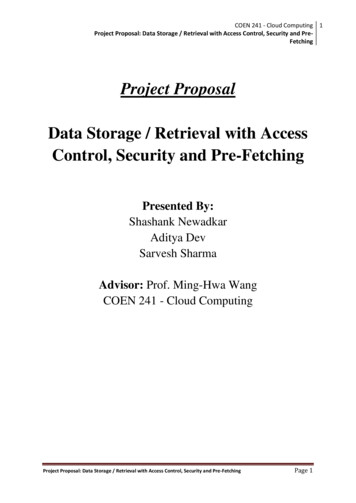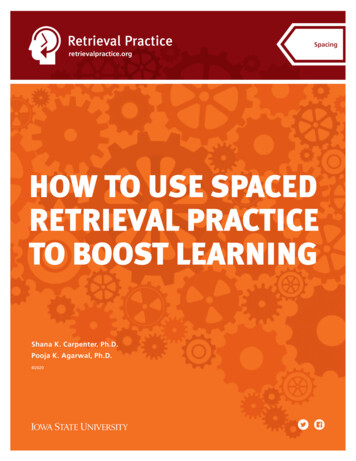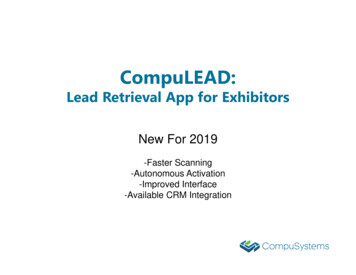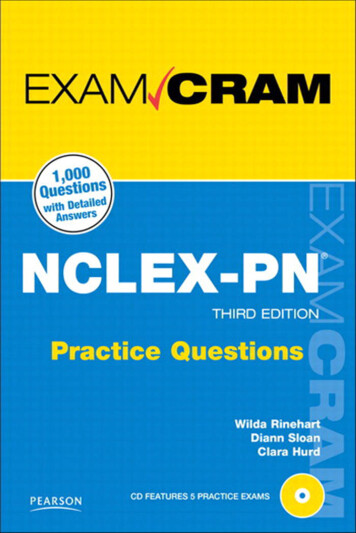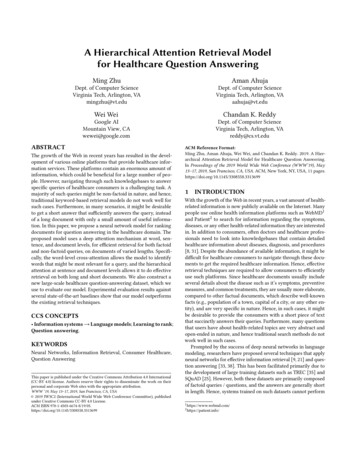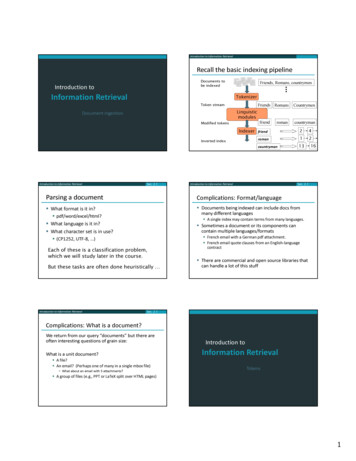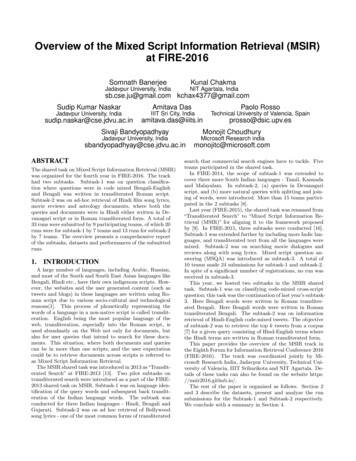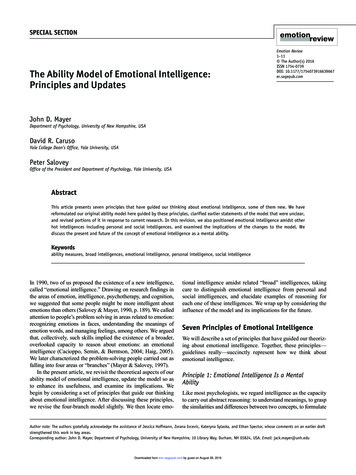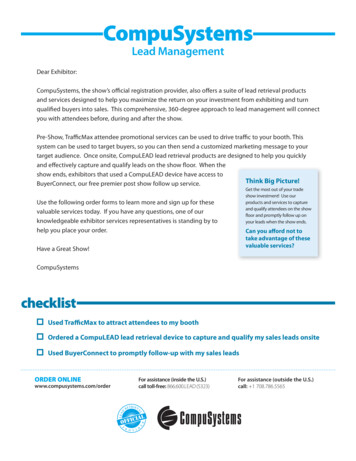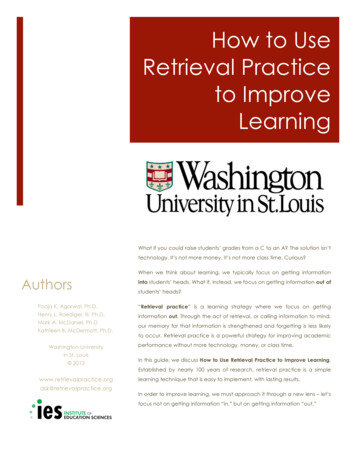
Transcription
How to UseRetrieval Practiceto ImproveLearningWhat if you could raise students’ grades from a C to an A? The solution isn’ttechnology. It’s not more money. It’s not more class time. Curious?When we think about learning, we typically focus on getting informationAuthorsinto students’ heads. What if, instead, we focus on getting information out ofstudents’ heads?Pooja K. Agarwal, Ph.D.“Retrieval practice” is a learning strategy where we focus on gettingHenry L. Roediger, III, Ph.D.information out. Through the act of retrieval, or calling information to mind,Mark A. McDaniel, Ph.D.Kathleen B. McDermott, Ph.D.Washington Universityin St. Louis 2013our memory for that information is strengthened and forgetting is less likelyto occur. Retrieval practice is a powerful strategy for improving academicperformance without more technology, money, or class time.In this guide, we discuss How to Use Retrieval Practice to Improve Learning.Established by nearly 100 years of research, retrieval practice is a ce.orglearning technique that is easy to implement, with lasting results.In order to improve learning, we must approach it through a new lens – let’sfocus not on getting information “in,” but on getting information “out.”
What isretrievalpractice?Retrieval practice is a strategy in which calling information to mindsubsequently enhances and boosts learning. Deliberately recallinginformation forces us to pull our knowledge “out” and examine what weknow. For instance, I might have thought that I knew who the fourth U.S.President was, but I can’t be sure unless I try to come up with the answermyself (it was James Madison). Often, we think we’ve learned some pieceThink of retrievalas a learningstrategy, not anassessment tool.of information, but we come to realize we struggle when we try to recall theanswer. It’s precisely this “struggle” or challenge that improves our memoryand learning – by trying to recall information, we exercise or strengthen ourmemory, and we can also identify gaps in our learning.You’re probably already using retrievalpractice.Sounds like a no-brainer? Probably because you’re already using retrievalpractice in your classroom! You might ask students questions during class,give quizzes and exams, and/or provide homework as a way to “practice”what was learned – these are all examples of what we call retrievalpractice. The big difference, however, is that retrieval should be used as alearning strategy, not an assessment tool. In fact, research demonstratesthat retrieval is a more potent learning strategy than other techniquescommonly used in classrooms, such as lecturing, re-reading, or taking notes.So, instead of asking students to retrieve information only duringassessments, encourage retrieval during learning to improve students’understanding and retention of classroom material.2How to Use Retrieval Practice to Improve Learning
Why doesretrieval practiceimprove learning?Again, when we think about learning, we typically focus on gettingJust like exercise,learning works thesame way:“no pain,no gain.”information into students’ heads. Teachers might lecture, show videos,encourage note taking, and/or provide review sheets. Students often study byre-reading their textbooks, highlighting information, and/or reviewing theirnotes. In both of these situations, the focus is on getting information “in,” withthe hope that it sticks. We’ve all had the experience of feeling like thesemethods work – if I cram, and re-read, and study my notes, I feel fairlyconfident that I know the information. And indeed, cramming pays off – wetend to do well on a test. So what’s the problem?The problem is that these methods only lead to short-term learning. Have you ever asked students about material youcovered earlier in the semester, only to find that they’ve forgotten most everything? This common situation arisesbecause of an assumption we make about memory: when information comes to mind easily and feels “fluent,” we’velearned successfully. Much to our surprise, however, memory researchers have demonstrated that the opposite is true:when information comes to mind easily and feels fluent, it’s easy to forget. In other words, just because we learnsomething quickly and easily does not guarantee we’ll remember it.Challenging learning leads to long-term learningRetrieval practice makes learning effortful and challenging. Because retrieving information requires mental effort, weoften think we are doing poorly if we can’t remember something. We may feel like progress is slow, but that’s when ourbest learning takes place. The more difficult the retrieval practice, the better it is for long-term learning. For instance,recalling an answer to a science question improves learning to a greater extent than looking up the answer in atextbook. And having to actually recall and write down an answer to a flashcard improves learning more than thinkingthat you know the answer and flipping the card over prematurely. Struggling to learn – through the act of “practicing”what you know and recalling information – is much more effective than re-reading, taking notes, or listening to lectures.Slower, effortful retrieval leads to long-term learning. In contrast, fast, easy strategies only lead to short-term learning.3How to Use Retrieval Practice to Improve Learning
Does retrievalimprove morethan justmemorization?By using retrieval practice as a learning strategy (not an assessment tool!), we exercise and strengthen our memory.Research demonstrates that this improvement in memory and long-term learning is flexible, which: Improves students’ complex thinking and application skills Improves students’ organization of knowledge Improves students’ transfer of knowledge to new conceptsIn other words, retrieval practice doesn’t just lead to memorization – it increases understanding. Because students havea better understanding of classroom material by having practiced using this information, students can adapt theirknowledge to new situations, novel questions, and related contexts. You can use a variety of question types (fact-based,conceptual, complex or higher order, etc.) to ensure that students are not memorizing, but using information flexibly.As an additional benefit, retrieval practice helps us to identify gaps in learning. In other words, not only does retrievalimprove learning and help us figure out what we do know – more importantly, it helps us figure out what we don’t know.This crucial benefit of retrieval practice is called metacognition, or awareness of what students know and don’t know.For instance, some students study hard for tests and don’t do well, usually because they studied what they already knew– they didn’t study what they didn’t know. By engaging in retrieval practice, students are able to evaluate what theyknow and what they don’t know, and then make better study decisions. Improved metacognition also benefitsteachers: by seeing what students know and don’t know, teachers can adjust lesson plans to ensure that all students areon the same page (similar to formative assessment). An important component of metacognition is feedback, orproviding students information about whether they got something correct or incorrect. Without feedback, studentswon’t know how they performed. Thus, feedback should always be provided to students after retrieval practice.Retrieval practice encourages flexibleunderstanding, improving higher orderthinking skills and transfer of knowledge.4How to Use Retrieval Practice to Improve Learning
For which grade levels,subject areas, and students isretrieval practice appropriate?All grade levels!Whether you use retrieval practice with 3rd graders or college students, a great deal of research has shown that retrievalpractice is beneficial for all ages (even older adults). It is a straightforward technique that can be applied in a variety ofways, for a variety of ages.All subject areas!Research has shown that retrieval practice improves learning of: Science Mathematics Social studies/history Vocabulary learning Foreign language vocabularyAll students!Our research demonstrates that retrieval practice benefits both low and high ability students. Because retrieval practiceis a simple, flexible learning strategy, it can be adapted to a wide variety of situations, including special education andgifted classrooms. Further, students can practice retrieval at home (e.g., answering practice questions, using flashcards)or in the classroom (e.g., with low-stakes quizzing). In other words, retrieval practice isn’t just a teaching strategy; it’s apowerful study strategy, too.5How to Use Retrieval Practice to Improve Learning
How do Iimplementretrievalpractice?First, use retrieval practice to engage all students, not just one student being called on. Second, keep in mind thatretrieval practice should be used as a learning strategy, not an assessment opportunity. Third, always provide feedback.Clickers or colored index cardsClickers, or “remotes” for personal responding, are an engaging way to implement retrieval practice, helping studentsrecall information from mind. Do you have to use clickers? No! Clickers may be easiest for gaining instant feedback forboth the student and the teacher, but the key to retrieval practice is to engage students in recalling information frommemory. Paper-and-pencil and computer- or web-based quizzes can be used to accomplish the same retrievalpractice goals as clickers. Note that clickers/online quizzes may require you to write retrieval questions in advance.Alternatively, each student could have their own set of colored index cards, with the letters A, B, C, and D on them (ortrue/false, or 1, 2, 3, etc.). This way, you can ask a question (on the fly) and students can close their eyes while raising theappropriate index card to identify their response. It’s an easy, cheap alternative to using clickers, and you can provideimmediate feedback after students respond.Bell work or exit ticketsGive small slips of paper at the very beginning of class as students are entering the classroom (“bell work”) or beforestudents leave the classroom (“exit tickets”) that include questions about content learned in class. It could even be asimple writing prompt (e.g., “Write down everything you remember from the previous class”). This engages students inretrieval practice, while conserving classroom time so you can focus on teaching – but don’t forget to give feedback!Page protectors with dry erase markersInsert a piece of paper or cardboard into a page protector. This becomes a cheap, do-it-yourself “dry erase board” foreach student. You can call out a question and students can write down an answer – even a short answer response –and hold up their dry erase board. Again, you can quickly scan the room and provide appropriate feedback.6How to Use Retrieval Practice to Improve Learning
What are potentialchallenges if Iimplement retrievalpractice?Do I need to change my textbook?No! Retrieval practice works with any textbook materials, especially those that come with practice questions. In ourresearch, we used the classroom teacher’s textbook materials and we consistently found that retrieval practice wasbetter for learning than was re-reading or re-studying textbook material without retrieval practice. Retrieval practice isa very flexible learning tool that you can use with any materials; you don’t have to change your curriculum. Simplyadapt your classroom materials to serve as practice retrieval questions.Do I need to change my style of teaching?No! You can keep your style of teaching exactly the same. We simply suggest that you insert retrieval practice activitiesafter your lessons to improve students’ learning and metacognition. Retrieval practice activities can be completelyseparate from your teaching and lectures, meaning that retrieval practice can be a stand-alone activity. You canteach and use your typical activities in exactly the same way as you have been doing.If I spend time using retrieval practice, I can’t cover as muchmaterial.Retrieval practice doesn’t take more classroom time – it involves using classroom time more effectively. Think about theactivities you currently use in class – in other words, are students using their “time on task” effectively? How can you besure that students are learning when you present material (especially if students are re-reading or taking notes)?Research demonstrates that students learn during retrieval practice. So, swap less effective activities with retrievalpractice strategies. You’ll spend the same amount of time teaching, but you’ll be more effective.7How to Use Retrieval Practice to Improve Learning
123FrequentlyAskedQuestionsHow is retrievalHow much retrievalDoes retrievalpractice differentpractice do I havepractice increasefrom “coldto give?test anxiety?calling?”The more the better, and space itNo, in fact it decreases testout. Practice makes perfect, andanxiety! Students not only becomeTeachers often use retrievalthe more the retrieval practice, theused to the process of retrieval, butpractice in their classrooms byharder it is to forget information. Inbecause learning increases, theysimply asking questions throughoutaddition, spacing it out makesbecome more comfortable withtheir lessons and calling onretrieval more challenging, andcourse content and less anxiousstudents to provide a responseremember that the moreabout upcoming exams. Our(also known as “cold calling”).challenging the retrieval practice,surveys of middle school and highTeachers in our focus groups saidthe better. So, you could give aschool students confirm that 67%that they preferred retrievalquick quiz immediately after areport a decrease in test anxiety bypractice strategies because theylesson, a week after a lesson, andthe end of the school year.engage the entire class. Thea month after a lesson. Thesestandard cold calling procedure,“relearning” sessions are importanton the other hand, allows studentsto refresh our knowledge. Studentswho were not called on to be “offmight forget in between relearningthe hook.” By engaging everysessions – that’s normal. But,student in retrieval practice, everystudents will also “relearn”student reaps its benefits for long-information more quickly andterm learning.effectively each time they engageNotsure8%More4%Aboutthesame21%Less67%in retrieval practice.8How to Use Retrieval Practice to Improve Learning
123Should I provideMultiple-choice orShould I give retrievalfeedback aftershort answer?practice for aretrieval practice?All of the above! Our researchgrade?demonstrates that both short answerYes. Feedback helps improveand multiple-choice retrievalNo! In fact, providing retrievalstudents’ metacognition. Withoutpractice enhance learning. In realpractice without points or a grade willfeedback, students don’t know whatclassrooms, the retrieval benefit frommaintain focus on retrieval practicethey got correct and what they gotshort answer vs. multiple-choiceas a learning strategy, not anincorrect during retrieval practice.quizzes appears to be similar. So, useassessment tool. Students will feel lessProviding feedback is a key towhat’s easiest for you! Clickerpressured and more comfortablepowerful retrieval practice. Feedbacksoftware is typically used for multiple-when making mistakes (which is gooddoes not mean more work for you,choice questions. If you give studentsfor learning!), you can implementgrading more quizzes andbell work or exit tickets, a shortchallenging retrieval practice withoutassignments. Simply discuss or displayanswer response might be moreworrying about negativethe answers and have students self-practical.consequences to grades (and you’lllikely see grades increase!), andgrade their own retrieval practice.Also, the more elaborate thefeedback (e.g., with explanations),the more powerful. Learning andmetacognition increase whenstudents receive explanations aboutwhy they were correct or incorrect.What types ofquestions should Iinclude in retrievalpractice?Should I provideretrieval practicebefore, during, orparents won’t worry that retrievalpractice is standardized testing indisguise (it’s not!). Instead, retrievalpractice is a tool to help students, notpunish them. It improves learning, itimproves metacognition, and itafter a lesson?decreases test anxiety. ProvideRetrieval practice is more robust if itfeedback, not grades or points.takes place after a lesson. Again, themore challenging the retrieval, thebetter. Yet any schedule of retrievalpractice enhances learning.Students, teachers, and parentsshould be encouraged to know thatA variety! Research demonstratesthe precise schedule of retrievalthat different questions improvepractice can be flexible. Studentslearning in different ways. If you wantcan also practice answeringstudents to learn facts, concepts, andquestions for homework and spacinghigher order or complex topics,is important. Don’t give studentsimplement retrieval practice usinghomework on what they learned infact-based, concept-based, andclass earlier that day – challengecomplex questions. Don’t just stick tothem by providing homework onone type or another.content learned last week.9How to Use Retrieval Practice to Improve Learning
Retrieval PracticeImplementation Checklist Use retrieval practice as a learning strategy, not anassessment tool. Make retrieval practice low-stakes or no-stakes (i.e., not fora grade), to reduce anxiety and encourage trial-and-error. Provide retrieval practice frequently, as often as possible.Practice makes perfect! Don’t forget toprovide students withfeedback, animportantcomponent ofretrieval practice!Provide retrieval practice after a lesson is complete,perhaps even a few days or weeks later. Space it out. Use a variety of strategies to implement frequent retrievalpractice: clickers, index cards, bell work, quick writingprompts, etc. Use retrieval practice with a variety of students, subjectareas (science, history, etc.), and grade levels. Encourage metacognition by giving students feedback. Reassure students that challenging learning (via retrievalpractice) is a good thing! Examine your existing teaching strategies – do they focus ongetting information “in” or “out” of students’ minds? Arestudents being challenged, or is learning easy and “fluent?” Use a variety of question types: fact-based, conceptual,and higher order/transfer10How to Use Retrieval Practice to Improve Learning
Where can Ilearn moreabout retrievalpractice?For more information, please visit www.retrievalpractice.orgAgarwal, P. K., Bain, P. M., & Chamberlain, R. W. (2012). The value of applied research: Retrieval practice improves classroom learningand recommendations from a teacher, a principal, and a scientist. Educational Psychology Review, 24, 437-448.A review of our recent retrieval practice research in middle school classrooms.Dunlosky, J., et al. (2013). Improving students’ learning with effective learning techniques: Promising directions from cognitive andeducational psychology. Psychological Science in the Public Interest, 14, 4-58.A review of cognitive strategies that work (and don’t work) to improve student learning.McDaniel, M. A., Agarwal, P. K., Huelser, B. J., McDermott, K. B., & Roediger, H. L. (2011). Test-enhanced learning in a middle schoolscience classroom: The effects of quiz frequency and placement. Journal of Educational Psychology, 103, 399-414.A journal article on when to administer retrieval practice – before or after a classroom lesson – in 8th grade Science.McDaniel, M. A., Thomas, R. C., Agarwal, P. K., McDermott, K. B., & Roediger, H. L. (2013). Quizzing in middle school science: Successfultransfer performance on classroom exams. Applied Cognitive Psychology, 27, 360-372.A journal article on how retrieval practice improves students’ transfer to new information in 7 th and 8th grade Science.McDermott, K. B., Agarwal, P. K., D’Antonio, L., Roediger, H. L., & McDaniel, M. A. (in press). Both multiple-choice and short-answerquizzes enhance later exam performance in middle and high school classes. Journal of Experimental Psychology: Applied.A journal article about retrieval practice using multiple-choice vs. short-answer questions.Roediger, H. L., Agarwal, P. K., McDaniel, M. A., & McDermott, K. B. (2011). Test-enhanced learning in the classroom: Long-termimprovements from quizzing. Journal of Experimental Psychology: Applied, 17, 382-395.A journal article presenting our basic retrieval practice research in a 6 th grade Social Studies classroom.The development of this guide was supported by the Institute of Education Sciences, U.S. Department of Education through grants R305H060080 and R305A110550 awarded toWashington University in St. Louis. The opinions expressed are those of the authors and do not represent the views of the Institute or the U.S. Department of Education.Images from Open Clip Art Library, and Flickr users clayjar, Andrew Griffith, CollegeDegrees360, Gates Foundation, Mutiara Karina, H. Michael Karshis, Martin Marcinski, and RichardMessenger.11How to Use Retrieval Practice to Improve Learning
our memory for that information is strengthened and forgetting is less likely to occur. Retrieval practice is a powerful strategy for improving academic performance without more technology,
